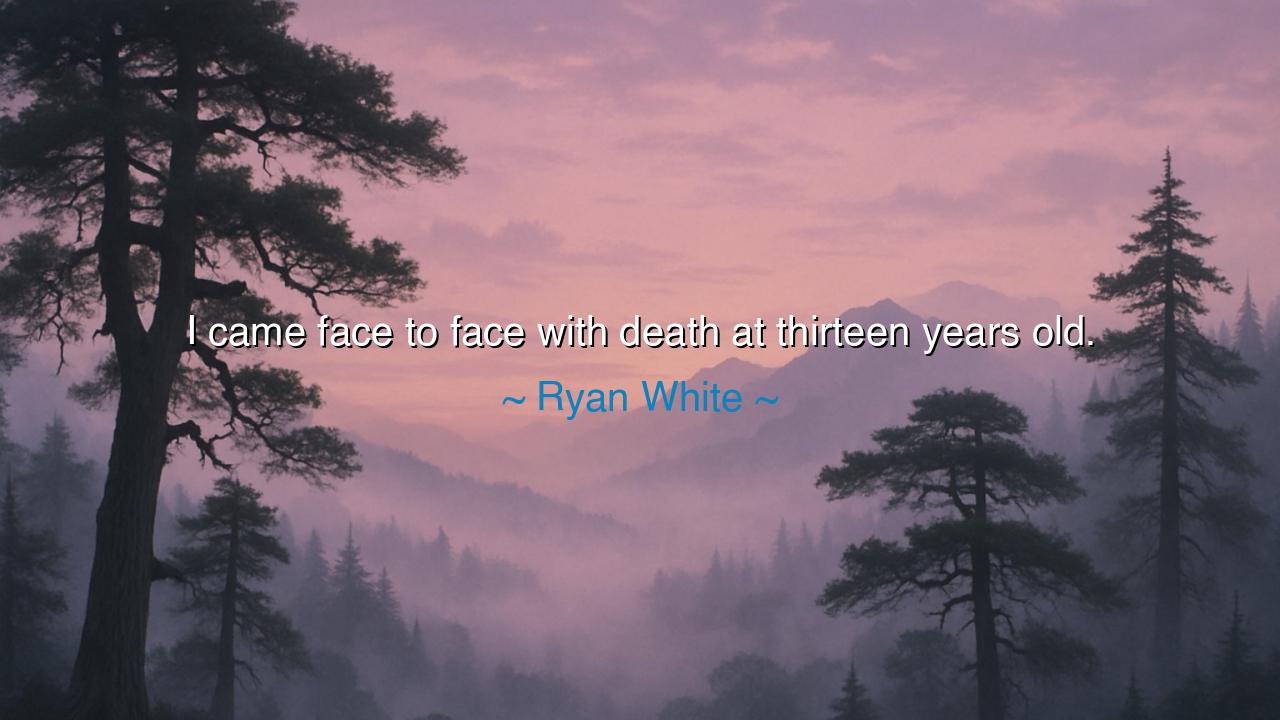
I came face to face with death at thirteen years old.






The young and courageous Ryan White, whose name became a symbol of innocence, strength, and compassion, once said: “I came face to face with death at thirteen years old.” In these words, there is both the voice of a child and the wisdom of an old soul — a heart that had seen the shadow of mortality and yet chose light over despair. His statement is not one of defeat, but of awakening. To come face to face with death so early is to see life with a clarity that few ever achieve; it is to recognize how fragile, fleeting, and therefore precious each breath truly is.
From the dawn of time, the ancients have written that it is in confronting death that a person begins to understand life. For those who have never stood upon the edge of mortality, life feels endless, its moments taken for granted like grains of sand beneath the feet. But for the one who has looked into the abyss — who has heard its silence and returned — every sunrise becomes a miracle, every heartbeat a gift. Ryan White was only thirteen when that revelation came to him, and from that moment onward, his life became a testament to courage and compassion in the face of inevitable suffering.
Born with hemophilia, a rare disorder that prevents blood from clotting properly, Ryan’s life was already one of physical fragility. But in the 1980s, when he contracted HIV through a blood transfusion, he entered a far darker battle — not just with disease, but with the cruelty of human ignorance. His illness, which was then misunderstood and feared, made him an outcast. Schools refused to accept him, neighbors shunned him, and society turned away. Yet even as a child, he refused to yield to bitterness. To face death at thirteen and still choose love — this was his greatness. In his suffering, Ryan became the mirror through which humanity saw both its prejudice and its potential for compassion.
When he said, “I came face to face with death,” he did not speak only of physical peril — he spoke of spiritual confrontation. For death is not merely the ending of breath; it is the fear that haunts the living, the shadow that tests the strength of the soul. Ryan White met that shadow and refused to let it define him. He continued to speak, to smile, to live. He became a voice not for the dying, but for the dignity of all who suffer. In him, the ancient hero’s fire burned — the same light that guided Job in the scriptures when he said, “Though He slay me, yet will I trust in Him.” Ryan’s defiance was not of anger, but of faith — faith that goodness could still exist even in pain.
The origin of this quote lies in the darkest chapter of his life, when his illness became public, and he was forced to confront both disease and discrimination. At thirteen, while most children dream of the future, Ryan was told he might not have one. Yet instead of retreating into despair, he transformed his trial into a mission. He stood before the world and showed that courage has no age, that innocence can be stronger than fear, and that death, when faced with truth and kindness, loses its power to terrify. His battle inspired a nation to rethink its understanding of AIDS, leading to the Ryan White CARE Act, a law that continues to provide support for those living with HIV/AIDS even today.
There is a profound lesson in his words, one that the ancients themselves would have honored: to live well is to live bravely in the face of mortality. The fear of death often binds people to mediocrity, but those who face it early — whether through illness, war, or loss — learn to cherish every moment as sacred. Ryan teaches us that no matter the darkness, we can bring light. No matter the suffering, we can still serve others. To face death is not to surrender to it, but to learn how to truly live — to love fiercely, forgive quickly, and stand fearlessly for truth.
The wise who came before us would call such a life heroic — not for its length, but for its depth. Like the young soldiers of old who died defending their people, or the saints who endured persecution for the sake of love, Ryan’s short years carried the weight of eternity. He reminds us that mortality is not the enemy; apathy is. The true tragedy is not dying young, but living without purpose. His story calls upon us to awaken — to stop drifting through life as though time were infinite, and instead live each day as the sacred gift it is.
Thus, Ryan White’s simple, haunting words — “I came face to face with death at thirteen years old” — are not an elegy, but a revelation. They teach that suffering, when met with courage, becomes strength; that death, when faced with truth, becomes teacher; and that the human spirit, when filled with compassion, becomes eternal. Let all who hear his story remember: when life tests you, do not turn away in fear. Stand tall, as Ryan did. Look death in the eyes — and choose to live, not in bitterness, but in beauty, bravery, and love.






AAdministratorAdministrator
Welcome, honored guests. Please leave a comment, we will respond soon